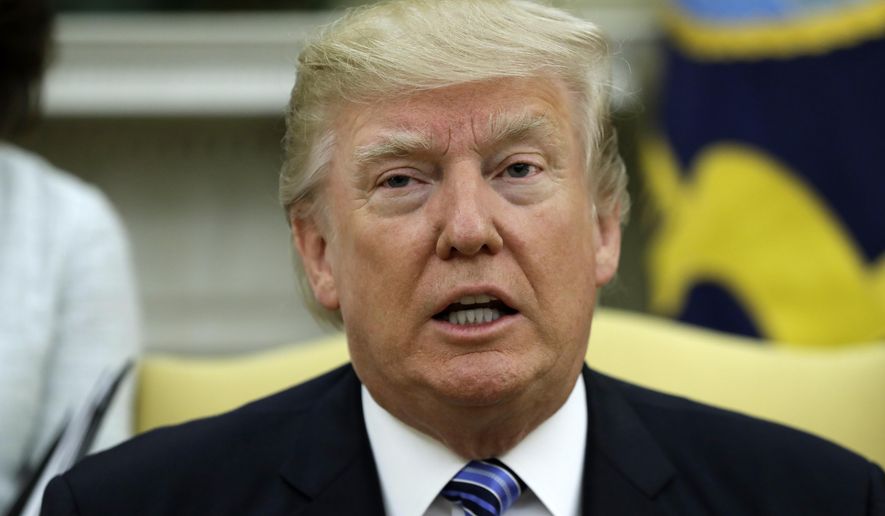WASHINGTON (AP) - President Donald Trump pressured divided Senate Republicans on Monday to pass their stalled health care bill in the next few weeks. But the measure came under renewed attack from within the GOP, with a moderate senator calling for a bipartisan approach and a conservative saying Republicans were “at impasse” and that party leaders were trying to “buy off” lawmakers’ votes.
Senators were returning to the Capitol after a weeklong July 4 recess that, if anything, saw GOP support erode for a bill fashioned by Senate Majority Leader Mitch McConnell, R-Ky. The measure would erase much of President Barack Obama’s health care law and scale back its coverage requirements, end its penalty on people not buying coverage, cut Medicaid and eliminate tax boosts on wealthier people.
“I cannot imagine that Congress would dare to leave Washington without a beautiful new HealthCare bill fully approved and ready to go!” Trump tweeted.
McConnell was studying changes aimed at gaining Republican support for the bill, which has encountered opposition from both ends of the party’s spectrum. GOP leaders hoped they could push it through the Senate before Congress departs again for an August recess.
Proposed revisions include rolling back some of its Medicaid cuts, adding additional money to combat abuse of opioids and other drugs, beefing up health care subsidies for lower earners and allowing insurers to sell low-cost policies offering meager coverage.
Moderate Sen. Susan Collins, R-Maine, told reporters she hoped McConnell’s changes “are more than tweaks and they’re an overhaul of the approach, or else I won’t be able to support it.” She said lawmakers of both parties “should work together to fix” flaws in Obama’s law - an approach that would contradict GOP doctrine, which has long called for repealing the 2010 statute.
Collins has criticized the bill for causing millions of people to lose health care coverage and blocking federal payments to Planned Parenthood.
Conservative Sen. Rand Paul, R-Ky., who has repeatedly said the GOP bill doesn’t go far enough in dismantling Obama’s statute, said it will “have to look more like repeal” for him to support it.
“I think we’re still at impasse,” Paul told reporters Monday in Shelbyville, Kentucky. “Some people think that they can add enough goodies, federal spending on there, to buy off the votes of Republicans.”
Paul said he spoke with Trump over the weekend. He said he thinks Trump wants “what I want, which is a conservative vision of health care which involves repealing Obamacare.”
At least a dozen GOP senators have expressed opposition to McConnell’s initial bill or criticized it. Republicans hold a 52-48 majority and Democrats stand united against the bill, meaning that just three GOP defections will doom it.
McConnell has acknowledged that if the broader effort fails, he’d want the Senate to turn to a smaller bill aimed at shoring up insurance marketplaces where companies have stopped selling policies and premiums are soaring.
But Trump and some conservatives - including Paul - have said if McConnell’s wide-ranging bill fails, they’d favor an initial bill repealing Obama’s law, followed by a second measure somehow replacing it. That sequence - Trump and party leaders favored it early this year but then abandoned it - would face all but certain defeat. Many Republicans remain unwilling to scuttle Obama’s statute without enactment of a replacement.
Conservative Sen. Ted Cruz, R-Texas, has proposed letting insurers sell any policies they’d like, as long as they also sell one that covers a list of services like maternity care that Obama’s law requires. Its fate was uncertain.
The plan has drawn support from the White House and some congressional conservatives. But it has limited appeal to Republican moderates who worry it would lead to unaffordable prices for people with pre-existing medical conditions. That’s because younger, healthy customers would be unlikely to buy extensive policies, leaving mainly those with costly medical problems purchasing them.
Meanwhile, a study found that the number of uninsured adults has grown by 2 million this year, underscoring that recent coverage gains have begun to erode.
The Gallup-Sharecare Well-Being Index, published Monday, found that the uninsured rate among adults was 11.7 percent in the second three months of this year, compared with a record low of 10.9 percent at the end of last year. The losses were concentrated among younger adults and people buying their own health insurance policies, the survey found.
The reduction could reflect rising premiums and dwindling choices in the insurance markets created under Obama. It could also flow from Trump administration actions and comments about withholding support for the law, which some insurers have said are making them reluctant to offer coverage in some areas.
___
Associated Press writers Bruce Schreiner in Shelbyville, Kentucky, and Andrew Taylor and Ricardo Alonso-Zaldivar in Washington contributed to this report.




Please read our comment policy before commenting.